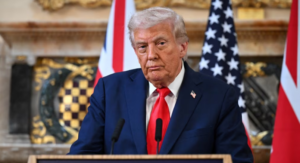
US President Donald Trump has announced that from November 1, 2025, additional 100% tariffs will come into effect on Chinese imports, which will be in addition to existing tariffs.
According to him, this decision was made in response to China’s recent export restrictions on rare earth metals and other critical materials.
According to a quick analysis by the Experts Club think tank, the possible consequences for the global economy could be as follows:
1) China is likely to respond with countermeasures: the introduction of tariffs, export restrictions, or lawsuits (including through the WTO).
2) The escalation of the trade conflict could trigger a chain reaction — countries dependent on China or the US may begin to “pull” supply chains.
3) The rise in the price of Chinese components will hit electronics, automotive, and equipment manufacturing, leading to higher prices for end products.
4) Companies will be forced to look for alternative suppliers, probably in Asia (Vietnam, India) or Latin America, which will increase logistics costs.
5) Increased instability could exacerbate capital flight to safe havens — the dollar, gold — and devalue the currencies of countries that trade actively with China.
6) Shares of technology companies that depend on Chinese components will come under pressure.
Many emerging markets depend on Chinese imports. Tariff increases will lead to inflationary pressure and a deterioration in the trade balance. Geopolitical alliances may also strengthen: countries may choose between the US and China, adjusting their foreign economic policies.
There may be leaks and problems in the implementation of measures. Administrative and customs burdens may increase the cost of complying with rules of origin, and it is clear that some companies will try to circumvent tariffs through “transit” countries.

The US imposition of an additional 10 percent duty on imported Chinese goods seriously violates WTO rules and not only fails to solve its own problems, but also disrupts normal economic and trade cooperation between the two countries, a spokesman for China’s Ministry of Commerce said in a statement on Sunday.
“China will file a lawsuit at the WTO against the US for its abusive practices and take appropriate countermeasures to resolutely safeguard its rights and interests,” the statement said.
According to it, China hopes the U.S. side will objectively and rationally consider and solve its own fentanyl and other problems, rather than threatening other countries with tariffs at every turn.
The Chinese Foreign Ministry also issued a statement in connection with the imposition of a 10% duty on imports of Chinese goods, calling on the U.S. to correct its erroneous approach and work with the Chinese side to engage in frank dialog, strengthen cooperation and resolve differences on the basis of equality, mutual benefit and mutual respect.
The Foreign Ministry emphasized that China is one of the countries in the world with the most strict and thorough drug control policies, and fentanyl is America’s problem, and China, in the spirit of humanism, has supported the U.S. in dealing with this problem, being the first country among other countries to put fentanyl-like substances in a separate category.